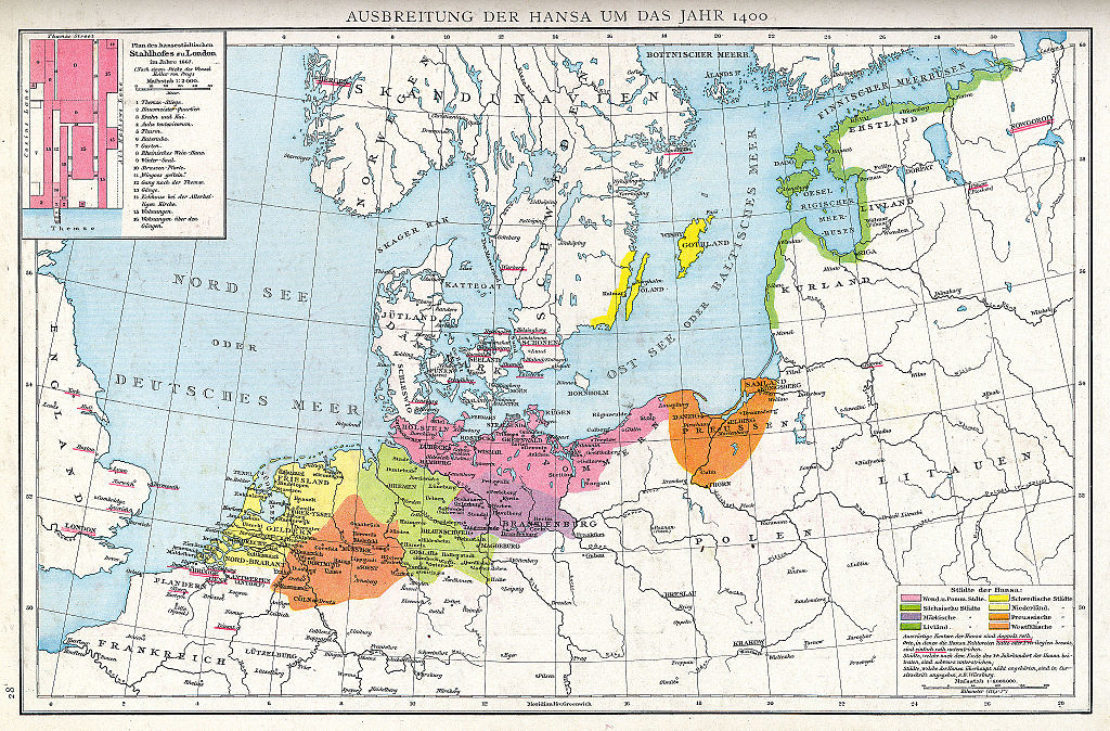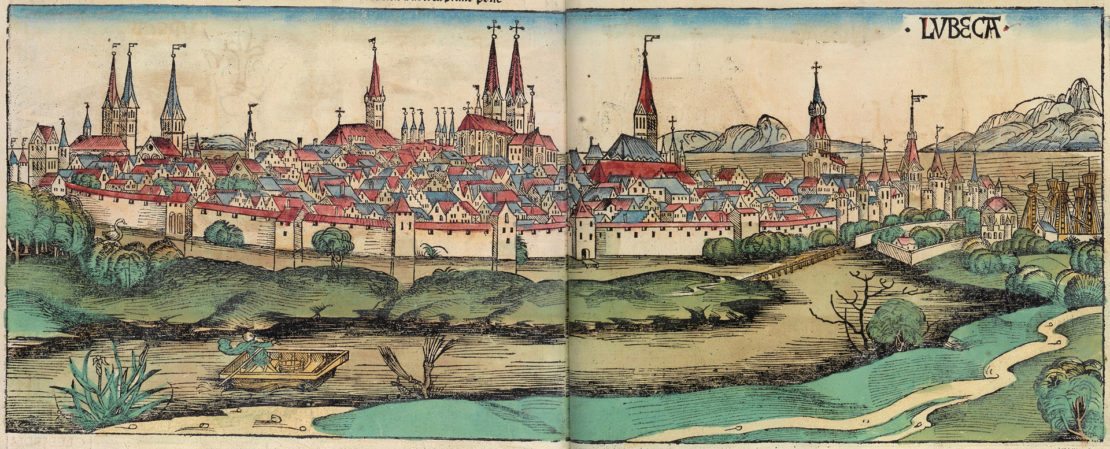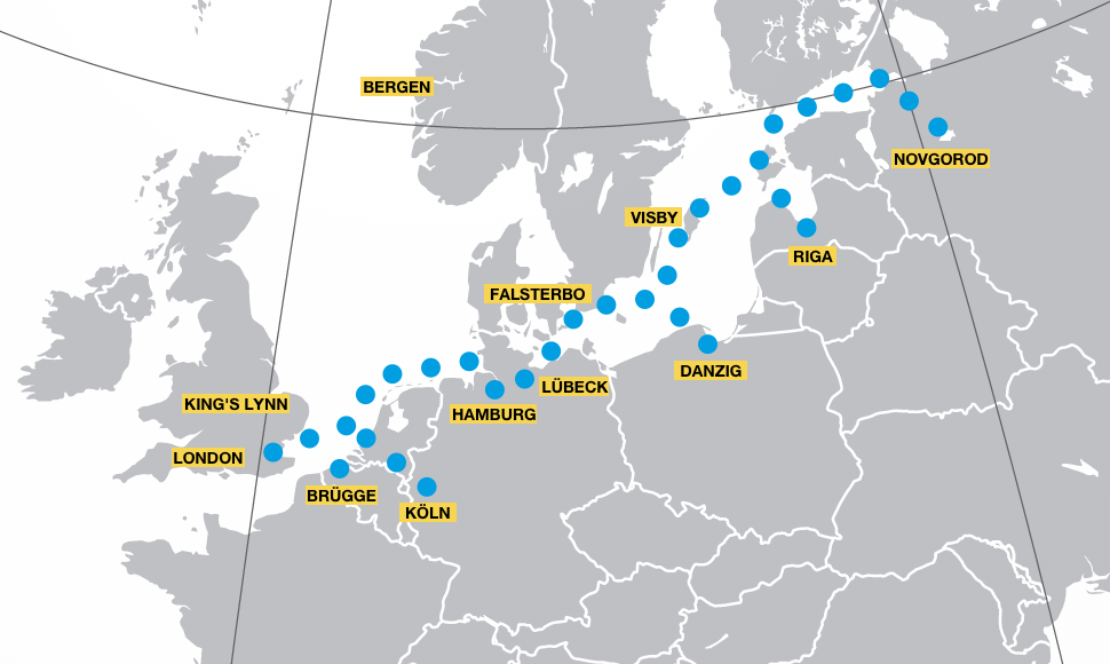What cities in the post-Brexit era could learn from a 14th-century trading bloc

As you fly from the country now known as Germany to Britain, the coastal geography of northern European cities gently unfurls. You can see where the sea smacks into them, or where yawning estuaries unfold like funnels between green and brown city and choppy blue water. You can track the snaking rivers and canals that form unrepentant umbilical connections to the settlements set a little further inland.
By their nature cities along coasts and rivers developed so they could be open to trade with each other. From the middle of the 13th century, and for some 300 years after, many settlements dotted along this route formed the prosperous Hanseatic League, a European trading confederation of market towns, before the rise of the nation state led to its dissolution.
The Hanseatic League is not well known, and today it lives on most prominently in the name of the German national airline Lufthansa, literally the 'Hansa of the skies', whose planes you can look out of – and down towards the Hanseatic cities – on the short journeys between mainland Europe and Britain. The letters HH on the number plates of cars in Hamburg stand for Hansestadt Hamburg: another proud little memory of this hidden history.
In the traumatised atmosphere of post-Brexit Britain, it is worth remembering the Hanseatic League. It could point us towards new relationships between progressive city dwellers in a world that otherwise seems to be putting the brakes on modernity.

Despite some of Britain's Leave voters longing to inhabit a fantastical realm immune to foreign influence, the reality is patently very different to that. In the late 1300s, Chaucer wrote about characters travelling to Jerusalem, and others who came from Europe; and it was at exactly this point that the Hanseatic League slowly started to coalesce, eventually influencing our isles.
The League is most easily understood as a loose federation of cities that acted together in self-interest to promote trade. The Hanseatic cities developed their own legal system, and their armies came to one another's aid. Merchants who wanted to buy and sell and travel were taking the lead at a time when nation states were not fit for purpose: in the case of England or Denmark, leadership was too centralised and authoritarian, while in German-speaking lands a nation had yet to be formed.
We think of nations today as elemental almost, immovable. Yet look at any city of Mitteleuropa and you'll see the many different names it has had as borders and regimes have shifted with the sands of time. Nations come and go. Cities endure.
"It is often said that great cities survived great empires," says Cristina Ampatzidou, editor-in-chief of the Rotterdam-based online publishing platform Amateur Cities. "So it is not unrealistic to think of cities as discrete entities that compete and collaborate with each other, independently from the states to which they belong."
Nations come and go. Cities endure
The cities involved in the Hanseatic League are found along the Baltic and North Sea coasts, and slightly inland too. The League stretched from Novgorod in the east – in what is now Russia – to London in the west. Tallinn, Riga, Gdańsk, Visby, Berlin, Cologne, Antwerp, Stockholm, Bergen, Kiel, Rostock, Dinant, Bruges, Turku, Groningen, Hanover, Wroclaw, Kaliningrad: all were involved at different stages in the Hanse's history, which ran on into the 1500s.
Most read this month
Fiction: Divided we stand, by Tim Maughan How Scotland is tackling the democratic deficit The Long + Short has ceased publishingThe League covered lands that today find themselves a part of the modern nations of Finland, Sweden, Poland, the Netherlands, Belgium, France, Norway, Lithuania, Estonia and Latvia. It was a huge – and hugely ambitious – undertaking in the days when communications consisted of ink and paper and the only viable method of travel was by ship. Wood, fur, wool, silver, herring, cod and salt were the main items traded. But what was also exchanged was knowledge. In some ways it was an exercise in what we today call 'soft diplomacy'. There was no maniacal ruler overseeing things – merchants met and talked. They raised armies and waged war against kings who threatened their businesses and their freedoms and their peace.
There was a kind of proto-democracy at work. Professor Rainer Postel, of the Bundeswehr Universität (Germany's equivalent of Sandhurst military academy), has described the Hanse as "a community of interests without power politics". As David Abulafia, Professor of Mediterranean History at Cambridge points out, "The lack of an elaborate superstructure was one of the things that made the Hanse work. Having said that, one should recognise that Lübeck in particular dominated the League for long periods."
Lübeck was where the merchants most often met; and where renewed recent interest in the Hanse eventually led to Angela Merkel cutting the ribbon at the brand new European Hansemuseum in the city last year.
Sign up to our newsletter
Germany today – multicultural, economically and culturally motoring, free and fair – seems like the ideal model for a modern European nation state. And part of that success lies in the gravitas the country has given to its Hanseatic history. For Germany is not a top-down country with one city unhealthily dominating as with France and Britain (regional economic inequalities have plagued Britain since the painful de-industrialisation of the 1980s, especially in the north). Germany respects federalism and its cities exist on a much more even keel. The way that Cologne, Munich, Frankfurt, Dusseldorf and Stuttgart all bring varied economic and cultural character to the party is pure Hanse. The former Hanseatic cities of Hamburg, Berlin and Bremen have city state status within Germany, putting them on the same level as a whole region or 'land' like Bavaria or Brandenburg.
So how about a new Hanseatic League? I ask Benjamin Barber, senior fellow at New York's Fordham University. "I believe you will find there is a new Hanse," he says, "that constituted itself about 10 or 11 years ago – including many of the original Hanseatic League cities." Barber is founder of the Global Parliament of Mayors, which he describes as a kind of Hanse of all cities, not just European ports, which will give cities a global urban voice and a common platform for action. The parliament convenes for its inaugural session in The Hague in September.
"Cities both exist within nations and transcend nations. Their power lies not just in the extent of de jure autonomy ceded or granted by 'higher' levels of government," says Bruce Katz, centennial scholar at the Washington DC thinktank the Brookings Institution. "Rather, cities have de facto power, the result of larger market and demographic forces and environmental imperatives that value proximity, density, connectivity and quality. Smart nations will see themselves as partners to their cities, setting strong platforms for urban prosperity and devolving powers, where appropriate, to give cities the flexibility to perform… Dumb nations will continue to dictate from above, stifling market activity and urban potential."

But could we go further? Could cities like London declare independence from the UK? London's economy is larger than that of Scotland and Wales combined. "States will not vanish or surrender their waning sovereignty," says Benjamin Barber. "But cities will meet across frontiers and work together to solve problems. The objective is not an independent London or New York, but interdependent cities collaborating globally. And that is happening."
London's voters largely wanted to remain a part of the EU and to maintain the city's status as an entrepôt. There is clearly a widening chasm between urban and rural life at the heart of many nations. Visualisations of Austria's recent presidential election showed the issue clearly: the country's cities voted for the Green candidate Alexander Van der Bellen, while the the rural districts went for right-wing nationalist Norbert Hofer (whose legal challenge to the close result has resulted in a rerun being announced for October). And in the USA in November, it's likely that Trump voters will also come from rural areas and Clinton voters from the cities. City dwellers are finding ever more in common with the world's other city dwellers than with their countrymen 50 miles down the road.
Back in Britain, one of history's little oddities pops up on the east coast. Boston in Lincolnshire and King's Lynn in Norfolk were both forward-looking Hanseatic League towns that traded with far-flung ports and hosted foreign merchants. King's Lynn contains the only extant Hanse House left in Britain (London's was knocked down to build Cannon Street Station in the 1800s). Yet in the EU referendum these two areas polled among the highest Leave votes of anywhere in the country.
"Things change," says LSE's Professor Tony Travers. "[King's Lynn] used to be very highly connected, but the economy moved on and left those trading ports like it in a different situation." Take, for example, the pivot towards the New World, with which trade made more sense from the west-coast ports like Bristol and Liverpool. While these boomed between the 1600s and 1800s, the Hanseatic ports declined and then died out. "One of the things that's interesting about the [referendum] decision is that it begs all sorts of questions about the future of the UK and its relationship with Europe; and of London and Scotland and their relationship with the rest of Europe. When the EU began as the EEC in the mid-20th century some saw it as a modern day Hanse. Now the EU seems to be waning, perhaps its successor will have to ape the Hanse even more."
So how about a new Hanseatic League?
For all its complex beauty, life can ultimately be reduced to a series of binary options: yes or no, stick or twist, in or out, innovation or stagnation, modernity or mythology. The referendum result was disappointing for many progressive observers because it felt like a step backwards. Despite being primarily about trade monopolies and money making, the Hanse was, in its way, an early stab at stepping forwards: it encompassed internationalism, rational thought, free trade, loose democratic institutions and, most crucially of all, movement.
The future, for many observers, can only be understood in terms of the free movement of people, capital, goods and ideas. It is this necessary movement, and its possible curtailment, that could be the spark that leads to cities like London to seek independence and parity with other world cities – rather than with the rural hinterlands of Britain.
Next
Brexit: How systems change What cities of the future can learn from brutalism What old ideas should be revived?Of course, cities seceding from their nation states would provide huge headaches for countries whose biggest economic driver had been removed – as well as likely deepening ideological differences between city and rural dwellers. Moreover, cities need the food the countryside provides.
Yet for all the potential pitfalls, city states can thrive. Look at Singapore, Hong Kong, or de facto city states like Dubai and Abu Dhabi. One of the most telling characteristics about these four – all of course former British imperial enclaves – is that they are utterly outward looking. To return to the sky analogy, it's the airlines of each of these (Singapore Airlines, Cathay Pacific, Emirates and Etihad) that open up each respective city to the world in the way that the machinery of the Hanse did on the Baltic Sea 600 years ago. And it's the unions each city makes with other places that also look thoroughly Hanseatic in character. A model for modern city states, then. But is it one that we want?
"The Hanseatic League was not always accepted by local citizens," says Cristina Ampatzidou, "because the privileges granted to the Hanse merchants were forcing local traders out of competition and many cities took steps to eliminate them. The reasons the countryside is turning to the right [globally] are not independent from cities turning increasingly into speculation machines for the profit of a happy few. It is basically these systemic contradictions that must be addressed before we resort to more isolationist ideas that would intensify the urban-rural political divide. The bottom line is not whether a contemporary Hanse-esque federation is possible, it probably is; but whether it is actually desirable."